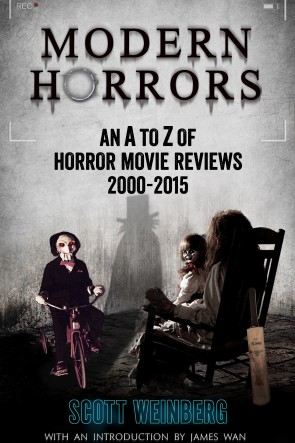Review: THE GHOST TRAIN DOESN’T STOP HERE ANYMORE{0}
All aboard the horror express…
As a train careers through the dark, Jeremy (Jonathan Rigby), Laura (Claire Louise Amias), Miranda (Jamie Birkett) and Freddie (James Swanton) all find themselves guests at a mysterious costume party on board. While their chosen callings (respectively a financier, a politician, a gossip journalist and a paedophile rocker) mark them as modern monsters, they also wear the fancy dress of more traditional storied monsters (a devil, a vampire, a broken doll and a ghost) – with fifth guest Robert (Billy Clarke) lying dead drunk on the floor in his Frankenstein’s monster mask. Soon this quintet is joined by their hostess, Dr Myra Lark (Jenny Runacre), who will challenge each of them in turn to tell a story (also about monsters), and join in with a story of her own, until the truth finally emerges of what they are doing on this runaway locomotive.
The Ghost Train Doesn’t Stop Here Anymore is a portmanteau play – six stories written by six different playwrights, with a wraparound written by the play’s director Sean Hogan. In Christopher Fowler’s The Devil’s Children, an English student and a Russian man become trapped in a St Petersburg lift haunted by historical horrors. Stephen Gallagher’s Cheeky Boy sees a dead ventriloquist’s antique dummy given a new voice to tell its own less than salubrious story. Lynda E.Rucker’s #Goddess has the ur-myth of the vamp rebirthed for the narcissistic Facebook generation. In Robert Shearman’s Dead Scotsmen, Shakespeare’s cursed play haunts a pair of aging thespians. In Lisa Tuttle’s The Green Rest, pagan ghosts both embrace and reject the living who have built a home over their burial ground. And finally in Kim Newman’s Frankenstein on Ice, scientists employed by sinister multinational Unwin must work out exactly which kind of Frankenstein’s monster they have just unearthed from the Arctic tundra before it is too late for humanity.
Each story comes with its own quality and character, but they all share a dark wit, a focus on monsters old and new, and a great degree of reflexivity. For the majority, this involves uncanny breaches of the fourth wall – characters addressing us directly, the audience being cast as props, a play about a play – that self-consciously foreground the theatrical form, breaking down our distance from the staged events and implicating us all in the monstrosity on display. Newman’s contribution, however – the last and the longest of the stories, and the only one (outside of Hogan’s framing story) to make use of the entire cast – is more metacinematic than metatheatrical, stitching together its Frankenstein’s monster not only from James Whale’s 1931 classic (as well as Mary Shelley’s source novel, with a bit of Bride of… thrown in), but also Re-Animator, The Thing, The Addams Family and The Blob.
Meanwhile, Dr Lark discusses the Mummy, Tuttle’s story slyly references the Invisible Man, and even the notorious ‘spider walk’ deleted from The Exorcist is here reprised onstage by actress Grace Ker (while playing a next-gen version of Frankenstein’s monster). You see, you can’t keep a good (or bad) monster down – and while the ‘Universal monsters’ may have had their day, the distinctly human evil that they embody just will not stay dead for long. The Ghost Train Doesn’t Stop Here Anymore explores the new forms that they take in a contemporary world plagued by climate change denial, corporate greed, armed conflict, political corruption and other vested (or should that be costumed?) interests. As these different stories confound the barriers between life and death, truth and fiction, the real monsters are gradually unmasked.
The cast shows considerable versatility in adapting to their various scenarios (Rigby and Birkett are particularly excellent) – and the production team have worked minimalist wonders from a black-painted set, conjuring their demons from the dark. And while this variety show is wickedly funny and mostly campish in tone, there are also some genuine frights as the coups de théâtre.
★★★★
– Anton Bitel








